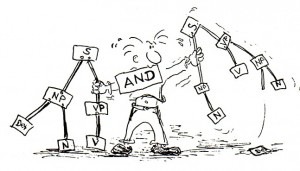There is a long and heavy sigh that now usually accompanies the end of another painful attempt in class to win her heart. Every other fallout from that – including sleeplessness, irritability and crankiness, and an inability to update blog as necessary shall be called the sytax syndrome. Who would have thought that I would find a formidable opponent in her after more than seven years of a painless mutual separation. A mutant demon just slightly different from the X-bar and Transformational Generative Grammar models of that undergraduate life has now returned in my American class, and the result is not pretty. Add that to the annoying schedule of activities that lap up all the waking moments of my week, and you have a little glimpse into the direction of my life at the moment. Underneath all sentences and utterances of English (and every other language of the world, in fact) lies this very benign-looking but really mischievous virus. It looks like network of trees and sticks from a microorganism when looked at under a lens. Unfortunately, everything else in the appraisal and understanding of language derives from its bosom, and there is no escape.
 What I’ve been doing then in an attempt to strike back is a diligent and thorough approach to its challenge. It involves sleeplessness and excessive eating, denial, and plenty tree diagram exercises among others. It is not proving to be an easy one, especially because of the pressure from two other equally demanding classes on pedagogy and teaching assessment. Whoever said the life of a graduate student is easy hasn’t been studying linguistics. And whomever said there’s no “i” in team hasn’t been studying phonetics either. In this curious battle between the tormented mind of a young linguist and the gigantic demon that is syntax and its ramifications, the “i” in team, just like its phonetic equivalent, is a long and lonely one, sandwiched between two formidable consonants. Meanwhile, here is (more than) a week long break for eating, travelling, fun and merrying in my hands that is about to yet again be intruded upon by syntax and generative grammar. What to do? What to do? If I can just admit to myself that much of my present resentment comes from a reluctance to now engage this familiar adversary on its own terms, maybe I’d actually do better. Or maybe not.
What I’ve been doing then in an attempt to strike back is a diligent and thorough approach to its challenge. It involves sleeplessness and excessive eating, denial, and plenty tree diagram exercises among others. It is not proving to be an easy one, especially because of the pressure from two other equally demanding classes on pedagogy and teaching assessment. Whoever said the life of a graduate student is easy hasn’t been studying linguistics. And whomever said there’s no “i” in team hasn’t been studying phonetics either. In this curious battle between the tormented mind of a young linguist and the gigantic demon that is syntax and its ramifications, the “i” in team, just like its phonetic equivalent, is a long and lonely one, sandwiched between two formidable consonants. Meanwhile, here is (more than) a week long break for eating, travelling, fun and merrying in my hands that is about to yet again be intruded upon by syntax and generative grammar. What to do? What to do? If I can just admit to myself that much of my present resentment comes from a reluctance to now engage this familiar adversary on its own terms, maybe I’d actually do better. Or maybe not.
At least if I lose my mind now, I’d know who is to blame. Right now, all I see are trees branching in different directions, upside down with thin black branches. Hello sytax. We meet again. How can we engage so that we part on good terms this time, and for good?
(Image from http://www.elloandfriends.uni-osnabrueck.de/wikis/1/show?n=syntax.syntax)
2 Comments to Side Effects of Syntax so far. (RSS Feeds for comments in this post)